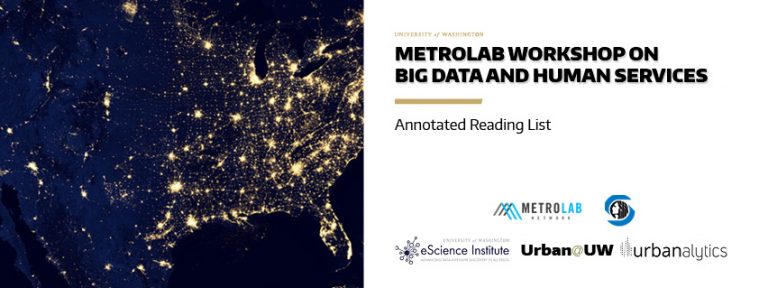Published on January 9, 2017

On January 17-18th 2017, the Metrolab workshop on Big Data and Human Services hosted by City of Seattle, MetroLab Network, and the University of Washington will convene experts from local government and universities to discuss common challenges and propose collaborative, data-driven solutions to human service issues. Urban@UW has compiled a brief reading list to help contextualize the conversation:
Push, Pull, and Spill: A Transdisciplinary Case Study in Municipal Open Government
The combination of civic and public entities leveraging data for increased efficiency and novel applications. These new approaches create occasionally contested territory where calls for transparency and openness are met with deep concerns over privacy and security. Calo, et al, engaged in “cross-disciplinary assessments of an open municipal government system” using Seattle, WA as a case study for future possibilities.
Trish Dziko is fighting inequality in tech, one student at a time
Crosscut offers a profile of Trish Dziko, co-founder of University of Washington’s Technology Access Foundation, looking at the impacts of her career in technology and working to collapse gaps in gender and race in the world of technology.
Interview: Justin Erlich on gaining insights from open data
A podcast, produced by The Department of Better Technology, which assists governments in enhanced software delivery systems and platforms, interviews Justin Erlich of UC Berkeley and Special Assistant Attorney General to the California Department of Justice, discuss Kamala Harris’s OpenJustice platform and the implications of open data for justice transparency issues.
NYC’s Amen Ra Mashariki on Putting Analytics, Open Data to Use to Improve City Operations
Amen Ra Mashariki, Chief Analytics Officer in New York City’s Office of Data and Analytics, is interviewed by GovTech Magazine about New York City’s data explorations and impacts on businesses, efficiencies, and potential evolutions.
Interfacing Urban Intelligence
Shannon Mattern, associate professor in the School of Media Studies at The New School, offers a critical perspective on possibilities for smart cities through a discrete focus on how citizens might physically interact with these systems.
Structured Open Urban Data: Understanding the Landscape
Barbosa et al. explore the emergence of open urban data initiatives across North America. An analysis of over 9,000 open data sets considers data integration opportunities and data quality issues associated with this new approach to public information.
Building an Urban Data Science Summer Program at the University of Washington eScience Institute
This paper describes the inaugural offering of the eScience Institutes Data Science for Social Good program, modeled after the University of Chicago program of the same name. Writers reflect on the process of organizing and structuring a program that brings together students and practitioners with varying backgrounds and experiences to design, develop, and deploy new solutions to high-impact problems in the Seattle Metro Area.
Big Data Could Help Some of the 200,000 NYC Households That Get Eviction Notices This Year
NextCity highlights benefits and important considerations in regard to tools developed by nonprofit data analytics firm SumAll, which uses data to help social workers decide where to focus their efforts.
Will Data Change the Face of our Cities?
City of Chicago Chief Data Officer, Tom Schenk Jr., opines in Open Resource Magazine that similar to start-ups and large companies, cities are poised to leverage big data – from Twitter to the Array of Things, to improve efficiency of their services.
In 2015, the Metrolab Network was announced as a part of the Obama Administration’s new “Smart Cities” Initiative to help local communities tackle key challenges such as reducing traffic congestion, fighting crime, fostering economic growth, managing the effects of a changing climate, and improving the delivery of city services.
The University of Washington is supporting the MetroLab workshop on Big Data and Human Services though the collaborative efforts of the eScience Institute, Urbanalytics Studio and Urban@UW.